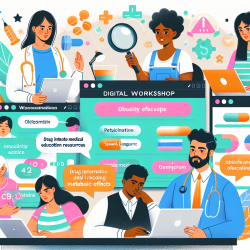Introduction
In the realm of pediatric care, the challenge of managing medication-related weight gain is becoming increasingly prevalent. A recent study titled "Clinician uptake of obesity-related drug information: a qualitative assessment using continuing medical education activities" offers valuable insights into the current knowledge base of primary care practitioners regarding metabolic adverse drug effects. This blog aims to distill the findings of this research and provide actionable strategies for practitioners to enhance their clinical decision-making skills.
Understanding the Knowledge Gaps
The study analyzed responses from 20,705 practitioners participating in six Continuing Medical Education (CME) activities. The results revealed significant gaps in knowledge, particularly in understanding the metabolic effects of atypical antipsychotics and other obesogenic medications. Key findings include:
- Correct responses regarding drug indications for autism were 17% below predicted levels.
- Knowledge about drug effects on insulin resistance was 62% below expectations.
- Understanding of chronic disease risks in mental illness was 34% below predicted levels.
- Knowledge of drug safety research was 40% below expectations.
Implications for Pediatric Care
Children are particularly vulnerable to the metabolic effects of medications, which can have prolonged impacts due to their developmental stages. As such, it is crucial for pediatricians and other primary care practitioners to be well-versed in the metabolic risks associated with medications, especially given the rising rates of obesity-related chronic diseases in children.
Practitioners can mitigate these risks by:
- Choosing the lowest effective doses and therapies with fewer metabolic side effects.
- Addressing underlying conditions that contribute to weight gain, such as sleep apnea and hypothyroidism.
- Providing nutritional counseling and monitoring for drug-related increases in appetite.
Strategies for Improvement
To address the identified knowledge gaps, practitioners are encouraged to engage in further education and research. Strategies include:
- Participating in CME activities focused on metabolic drug effects and obesity management.
- Staying informed about the latest drug safety updates and research findings.
- Collaborating with specialists in nutrition and endocrinology to develop comprehensive care plans.
Conclusion
The findings of this study underscore the need for ongoing education and collaboration among healthcare providers to effectively manage medication-related weight gain in pediatric populations. By enhancing their knowledge and skills, practitioners can make more informed decisions that prioritize the health and well-being of their young patients.
To read the original research paper, please follow this link: Clinician uptake of obesity-related drug information: a qualitative assessment using continuing medical education activities.










